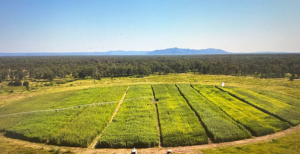Virgin Australia and Qatar Airways partner for sugarcane-to-SAF project

The project aims to establish a fully-integrated Ethanol to Jet (EtJ) facility that converts bioethanol derived from sugarcane grown onsite into 100% SAF, using proprietary PureSAFSM technology supplied from KBR, while also generating all of the project’s energy requirements from renewable sources.
The facility is expected to produce up to 96 million litres of SAF annually which will be supplied to nearby airports.
Early modelling indicates a potential lifecycle greenhouse gas emissions reduction of 70% compared to conventional jet fuel.
For the airlines, this project aligns with the broader Memorandum of Understanding (MoU) signed by Virgin Australia and Qatar Airways in October 2024.
The MoU cemented their intent to collaborate on sustainability initiatives that aim to reduce carbon emissions in air travel, and advance the use of SAF and Low Carbon Aviation Fuels (LCAF) in Australia.
In further encouraging support from the broader aviation ecosystem, The Boeing Company (TBC) has endorsed the project through a positive letter of support to RDA and in which TBC outlines its commitment to collaborate in a number of areas, including policy advocacy and the contribution of technical expertise, where relevant.
The project, currently in pre-final investment decision stage, aims to deliver SAF from early 2029.
Renewable Developments Australia’s managing director, Tony D’Alessandro, said the partnership with Virgin Australia and Qatar Airways marks a significant milestone in the development of a sustainable aviation fuel industry in Australia.
“We are proud to be working with two globally recognised airlines that share our vision of creating a domestic supply of Sustainable Aviation Fuel. This project is designed to deliver real, long-term emission reductions while building a new industry in regional Queensland.
“Our Ethanol to Jet SAF facility in the Charters Towers Region will be a fully integrated production site, generating sustainable fuel from bioethanol derived from locally grown sugarcane. Additionally, by repurposing by-products of the SAF production process to generate renewable power onsite, we are setting a new benchmark for sustainability in aviation fuel manufacturing.
“This initiative is more than just a step towards decarbonising air travel; it represents a major investment in Australia’s energy security and regional economic development.”
Virgin Australia chief corporate affairs and sustainability officer, Christian Bennett, said the project had close alignment with the priorities in the Virgin Australia and Qatar Airways MoU.
“The commercial aviation sector in Australia – indeed globally – faces an enormous task ahead in working towards a target of net zero carbon emissions by 2050, which we cannot do alone,” he commented.
“Working together with industry partners and government to establish a domestic SAF industry in Australia will be essential – not only to achieve these shared emissions goals, but to strengthen Australia’s liquid fuel security by reducing reliance on global supply chains and creating new, secure, jobs for those living in regional Australia.
“We are delighted to be working with our strategic partner, Qatar Airways, and the team at RDA to try and bring this project to life. It is a task strongly aligned with a key priority of our MoU with Qatar Airways, which at its core focuses on advancing SAF and LCAF certification, production, and commercial uptake through strategic collaborations, with a focus on investing in Australia.”


























